The world of film loves mining halls of folklore and legend for stories, and one of those oft-traveled halls belongs to King Arthur and his Knights of the Round Table. But which Arthurian movies are the best? Which are emphatically the worst? How do we make those judgements and why? These are not the questions that plague our era, but they sure do bug us from time to time, and so we have decided to rank the lot.
We should mention that it is fairly impossible to include every Arthurian movie on account of there being so many, and the fact that plenty of them are relatively inaccessible. So we have assembled a basic master list that includes films that are easy to find and watch. We have ranked them worst to best and included some helpful criteria to that end.
Ranking Criteria: We have decided to rank each movie according to three basic standards because life is more fun that way.
- Grails—How the story chooses to tackle (or ignore) Holy Grail questing and legend within the plot.
- Round Tables—How the story handles politics and romance.
- Excaliburs—How the story deals with action and magic.
And here is our very careful, very thorough ranking! The most thorough. The thorough-est.
10. Prince Valiant (1997)
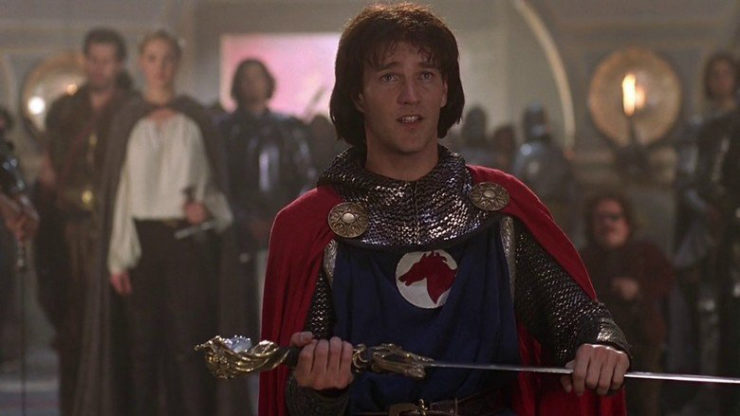
Loosely adapted from the comic strip of the same name, Prince Valiant is about the side characters in Arthurian legend. Squire Valiant, masquerading as Sir Gawain, must retrieve King Arthur’s sword Excalibur from Vikings led by an exiled Morgan le Fay.
Grails: No Grail quest here, everyone’s too busy journeying to Thule (a.k.a. Scandinavia) to do battle with evil Vikings.
Round Tables: The filmmakers really force the love story between Valiant and Princess Ilene, which is entertaining only to watch Stephen “Vampire Bill” Moyer and Katherine “Izzy Stevens” Heigl act out the rules of chivalry. Though Valiant (pretending to be Gawain) goes on about knights not being allowed to feel anything, and Ilene is engaged, their misadventures nonetheless bring them together. Yet the only interesting moment is when Ilene gives Valiant her ring to bring to her princely fiancé, ostensibly to prove that she is alive—only for her fiancé to reveal that Ilene said she would remove the ring only if her heart no longer belonged to him.
Excaliburs: Even though the plot revolves around Excalibur falling into the wrong hands, the logic doesn’t quite track. In a rehash of the original legend, the sword embeds itself in the stone floor of the Vikings’ throne room, to be pulled out by only the most worthy. Yet the person who is able to wield it is not Sligon, the Viking who stole it, but his unstable and psychotic brother Thagnar. It would appear that Morgan’s plan was less about handing Excalibur to someone new than to simply taking it away from her brother Arthur. Back in Camelot, the king is bereft without his sword (which he feels has “abandoned” him) and is all but ready to hand over control of his kingdom to anyone else. If that’s all it took to destroy the dream of Camelot, then maybe Morgan should have been allowed to succeed. —Natalie
9. Merlin and the Sword AKA Arthur the King (1985)
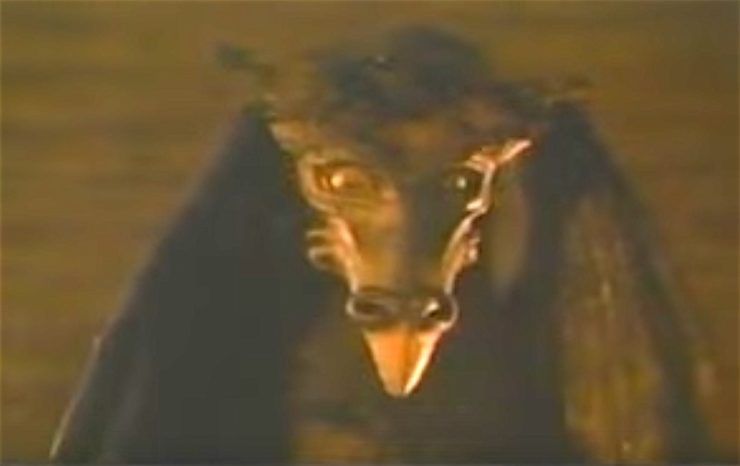
Modern-day Camelot enthusiast Dyan Cannon travels to Stonehenge, breaks away from her tour group, and falls into a shadowy netherworld, where she meets Merlin and Niniane. They create a mystical slideshow of their lives at Camelot, and watch as Arthur, Lancelot, and Guinevere are all undone by lust/Mordred/Morgana le Fay/destiny. This one inspires so many questions! Why is there a Limbo universe underneath Stonehenge? Why is Dyan Cannon fondling Stonehenge and murmuring sweet nothings to Merlin? How the hell could Malcolm McDowell make a boring Arthur? What on earth was Candice Bergen thinking? Couldn’t they have found a better dragon puppet?
Grails: The Grail becomes important in the last two minutes of the film, when an Astral Projection of Merlin tells Lancelot to ditch Guinevere and go on a Holy Quest to atone for his repeated adultery.
Round Tables: Lancelot and Guinevere fall in love at first sight…but only after Arthur refuses to allow her to be co-ruler, and also sends Lancelot to rescue her from Evil Pict Liam Neeson rather than doing it himself. Guinevere initiates the affair, which, according to Lancelot, brings about the fall of Camelot. This despite the fact that Morgana’s been plotting against Camelot the whole time, and, oh yeah, Mordred stabs Arthur to death with Excalibur. Yeah. Totally Guine’s fault. Also: this film includes the tale of Gawain and Dame Ragnelle, who is enchanted to look like a pig until Gawain’s love and respect for her breaks the curse.
Excaliburs: As far as knightly action goes, I have attended Renaissance Festival Living Chess Games that were better staged and fought than the action in this film. Arthur already has Excalibur, but doesn’t make a big deal about it. Later, Lancelot is able to wield Excalibur to defeat the dragon puppet Morgana unleashes through her magic. While Merlin and Niniane are both powerful magicians, Morgana is able to condemn them to HengeLimbo. Merlin and Niniane are trapped beneath Stonehenge for a thousand years until Dyan Cannon suggests they might be able to escape through the power of LOVE. When this works, they fly back to Camelot, ignoring Dyan Cannon’s desperate pleas for them to take her with them. —Leah
8. King Arthur: Legend of the Sword (2017)
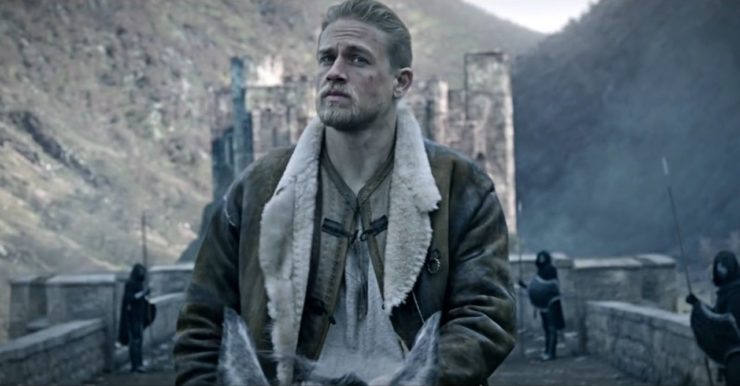
This charged action-fest from Guy Ritchie is the latest attempt to put Camelot on the big screen, bringing Arthur of the street (Charlie Hunnam) into the fold after being orphaned due to family trauma. His magical sword Excalibur grants him superpowers to defeat his evil uncle, Jude Law. And in case any of this imagery is too metaphorical: Jude Law is building an enormous tower. As he grows more powerful, the tower grow ever higher. And the only thing that can cause the tower to collapse is (A) Arthur’s mighty sword and (B) an enormous snake.
Grails: No interest in Grails this time around…these lads are probably scared they’ll get cooties from anything as feminine as a Grail. Lots of magic instead. Lots.
Round Tables: Not much romance here. In fact, pretty much the opposite of romance, even if Arthur clearly has a crush on his mage pal. The politics are all family oriented, with Jude Law causing tyrant problems and killing people to gain fancy magical powers. There’s a resistance within the kingdom against his rule, but they’re so much canon fodder as far as the story is concerned. And the knights have a very Merry-Men-in-Sherwood-Forest vibe.
Excaliburs: It’s a Guy Ritchie film. Action is the sole reason for its existence. Unfortunately a huge portion of that action is devoted to abusing and murdering the majority of the female characters present in the film. Oh, and Arthur runs a brothel? But it’s okay because he makes certain that the women working there don’t get beat up too bad! He’s kind of a mobster who extorts money from his fellow city-dwellers, and he calls men who annoy him “honeytits,” which is definitely an attribute the world has been waiting to see in the king of Albion. He runs Camelot like a frat house by the end, where the pledges are what count because he’d “rather have friends than enemies.” Round Table all the way, bro. Oh, and in case you were wondering? Excalibur is so huge, you need two hands to wield it. And once you use two hands? Your dead dad might just tell you the magic was inside you all along. There is a lot of magic, of course, most of it bound up in tropes from other fantasy narratives that the world knows quite well, from Lord of the Rings to Narnia. It’s eighteen kinds of wrong, but it clearly doesn’t want to be right. —Emmet and Leah
7. First Knight (1995)
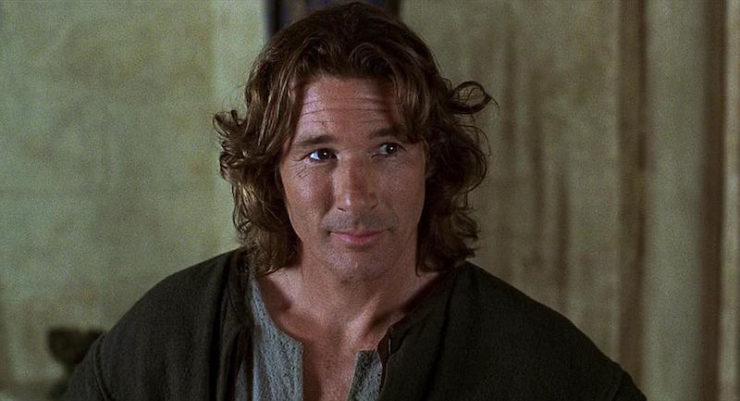
Look, envisioning Lancelot as a sort of vaguely Han Solo-ish lone wolf with a squinty charm isn’t the worst idea… provided you cast someone with the charisma to pull it off. That person is not Richard Gere. It is especially not a Richard Gere who can’t be bothered to even try a British accent. Set in Arthur’s later years, First Knight tries to smash together love triangle nonsense with a story about a scowling dude who wants to be king, with middling-at-best results. (Jerry Goldsmith’s swoopingly overwrought score does its very best to build a sense of grand romance, but is fighting a losing battle.)
Grails: What grail? This story has very little interest in mythology. Mostly it just borrows the names from Arthurian stories.
Round Tables: Guinevere (Julia Ormond) agrees to marry Arthur (Sean Connery, 35 years older than Julia Ormond) largely in order to protect her home. On the way to Camelot, she meets Lancelot (Gere, 16 years older than Julia Ormond), who is immediately far more into her than she is into him. Politically speaking, there’s a nasty former knight named Malagant roaming about setting fire to villages; he wants to be king, of course. None of the romance is very convincing, particularly given that upon their first meeting, Lancelot pretends he wants to rape Guinevere (as a tactic to get her away from a kidnapper) and later insists he knows when a woman wants him. Go away, Lancelot. Lance-not. Also everyone in Camelot wears blue, which, in this era of color-coded dystopias, is rather disconcerting.
Excaliburs: There is nothing magical about this movie. However, there’s one briefly gorgeous action sequence when Arthur sets a trap for Malagant and his forces. As Malagant burns an empty encampment, Arthur and his knights ride out from the woods. It’s dark, but the light from the fires glints off all their shiny armor (the horses even have mane armor! Which makes sense, if you think about it). It’s the most enthralling moment in the film… until mere moments later, when the night scene is inexplicably bright. Lancelot also has a nifty swordfighting scene or two—nothing flashy, just a touch of deft choreography. —Molly
6. King Arthur (2004)
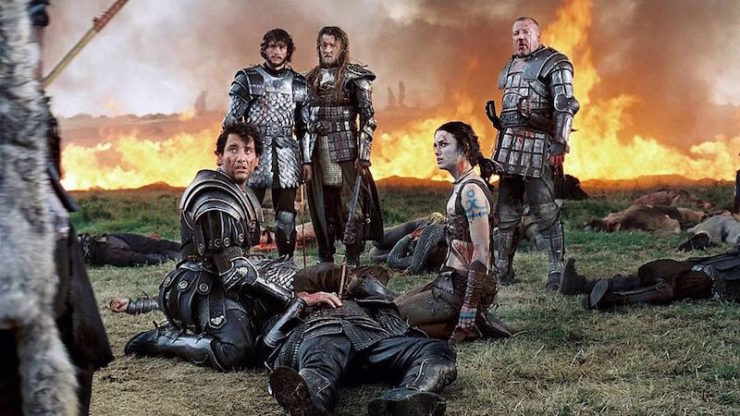
A gritty attempt to update Arthurian legend by adding a dose of realism (i.e. what if Arthur had actually been a real person, what would that look like?) The realism is somewhat sidelined by Keira Knightly’s Guinevere appearing in a leather-braided tube top.
Grails: Grails do not exist in gritty real-world legends. How dare you suggest such a thing.
Round Tables: There is some romance. Arthur (Clive Owen) and Guinevere like each other a whole lot, and he frees her pagan Celtic person from Catholic immurement, which is awfully nice. They get married at the end of the movie. There is a faint suggestion that maybe Guinevere and Lancelot (Ioan Gruffudd) could like each other, but the film leaves off the whole love triangle plot. We have Mads Mikkelsen as Tristan, but there is no Isolde because real-world legends only have room for one romance, dammit. (Or you could just decide that this is a proto-Hannibal/Will Graham situation, since Hugh Dancy is ably playing Galahad.) The politics are all there because in this version Arthur is a Roman who is fighting at the end of Rome’s occupation of Britain. He and his knights have served their fifteen years in the Roman army and are expecting to be relieved when they are given one last big mission to travel north of Hadrian’s Wall and grab a few people who are very important to Rome. This eventually leads Arthur to make friends with the Woads so that they can beat back the Saxon threat, and a bunch of his knights die in the process.
Excaliburs: There’s no magic in the story, obviously. All of the faux-historical leanings in this retelling are there to prop up a metric ton of action. Guinevere herself has been restyled to better resemble Queen Medb or Boudica more than the Guinevere of Arthurian legend. Despite its desire to bill as a more “realistic” version of what Arthur might have been, it is such a hodgepodge of resources that it morphs into its own brand of fiction, failing to resemble historical accuracy in the slightest. Sure, there were Romans and Saxons and Celts who fought each other in Britain at one point, but that’s about all the care that was taken. Which is a shame, because a carefully conceived “historical Arthur” could make for a very interesting story… it’s just not one the filmmaker’s want to tell. —Emmet
5. Sword of the Valiant (1984)
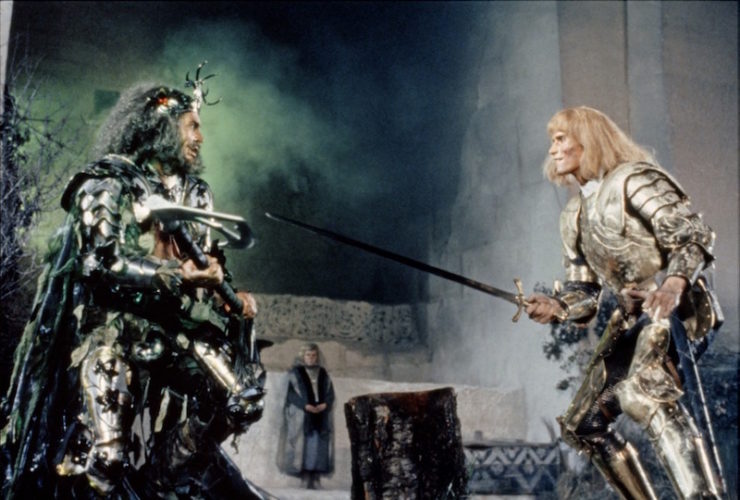
The second attempt by writer/director Stephen Weeks to adapt Sir Gawain and the Green Knight into a film—the first was released in 1973, but this second version found a (slightly) larger audience. Gawain himself is played by Miles O’Keefe, of Tarzan, the Ape Man fame; the director had hoped to cast Mark Hamill in the role, but the producers were not overfond of the idea. The film also features Peter Cushing, John Rhys-Davies, and Sean Connery as the Green Knight.
Grails: Not much to be said about the Grail in this one. There’s a lot of questing, but none that pertain to religious artifacts of any kind.
Round Tables: Politics is thin on the ground in this particularly story, although it does begin with Arthur scolding his knights for getting too comfortable and not being more active in their knight-ness. There is a fair bit of romance, though; Gawain falls for a mysterious lady, who keeps gifting him magical stuff that keeps him out of trouble—a ring that transports him, a cloth that prevents the Green Knight from being able to cut off his head. This poor woman is kidnapped and carried off and then liberated by a Baron, and it’s all very complicated.
Excaliburs: So much action and magic. Every action and magic. The whole story starts because of the Green Knight (can we talk about the fact that the world is convinced that Sean Connery belongs in Arthurian legend? maybe he’s the real Merlin) challenging Arthur’s court to a game that turns out to be rigged; he gives young Gawain one chance to behead him, then gets one chance in return. Trick is, he can reattach his head, and Gawain obviously cannot. He gives the kid a year to solve a weird riddle in lieu of death, so Gawain’s whole journey is supposed to be about figuring out that riddle. Instead he ends up fighting lots of people and getting magicked around. He does defeat the Green Knight in the end, with a little help from his fancy magical lady friend, who gives him that unbreakable kerchief to protect his head. But she has secrets of her own, and ends her role in the story by turning into a dove and flying back to Lyonesse. Tough break, Gawain. —Emmet
4. The Sword in the Stone (1963)
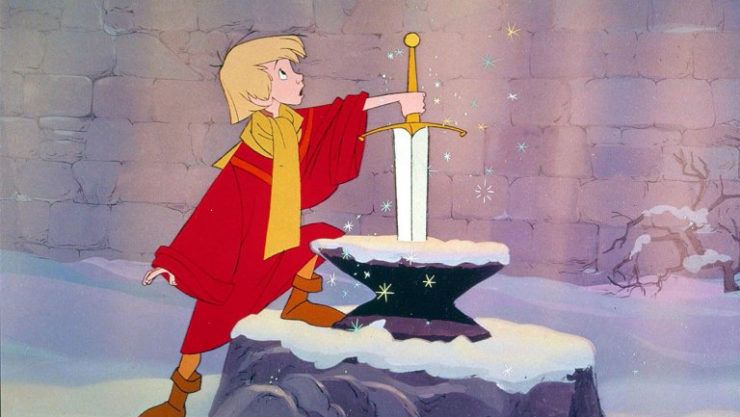
In Disney’s animated take on T.H. White’s The Once and Future King, absentminded wizard Merlin takes orphan Wart (a.k.a. Arthur) under his wing and teaches him how to be a good king by transfiguring him into a bunch of animals, all in preparation for Arthur eventually retrieving Excalibur.
Grails: Seeing as this focuses just on Arthur’s boyhood, there’s absolutely no talk of grails, holy or otherwise. In fact, the only significant vessel is an animated sugar cup.
Round Tables: Arthur’s still an orphan, but his true lineage doesn’t play into the story at all; no Pendragons to be found here. Nor does Guinevere come into play, though there is a messed-up scene in which Wart, transfigured by Merlin into a squirrel, attracts the attention of a flirty lady squirrel. Despite his attempts to explain that he’s a human, it’s not until he’s transformed back that she gets it—and she recoils, chittering in horror and sadness. Because lady squirrels mate for life, and now she has no mate, and why exactly was this cruel interlude necessary to the story?
Excaliburs: While there’s a promising moment with Wart assembling a dummy horse and jouster for Kay to practice with that shows the boy’s ingenuity, we never see him get to apply his dream craftings to anything real. He doesn’t even live vicariously through Kay, as he’s demoted from his brother’s squire after Merlin interferes with Wart’s chores. But in terms of literal Excaliburs, the movie gets there in the last 20 minutes of the movie (taking its sweet time ::grumble::), when Wart realizes with horror that he’s left Kay’s sword at the inn. With the building closed, he reaches for the closest substitute: the mysterious sword in the stone in the middle of the town square. Down comes the radiant light and Disney-esque “ahh”ing, and next thing we know, Wart is King Arthur. —Natalie
3. Excalibur (1981)
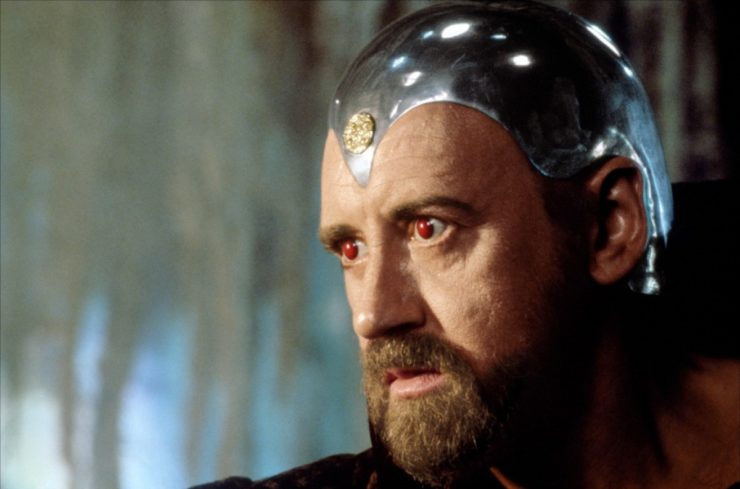
I saw Excalibur for the first time a few years ago, at the Met, which might be the best way to watch it, as it is very long and at times slow, and the distractions of the modern era are many. That said, it’s also very Arthurian, and is long enough to include even Uther (Gabriel Byrne? Really?), who becomes king and then makes a very stupid decision: He absolutely must sleep with the Duke’s wife, Igrayne, who dances like a glorious ren faire maiden of ye olde 1970s. Arthur is begotten, and the story goes from there, following familiar ground involving Guinevere, Merlin, Morgana (a mashup of Morgan le Fay and Morgause, played by a stunning young Helen Mirren), Lancelot and the rest. This is all the good stuff; the less good stuff is that much if not all of the dialogue appears to be looped, which gives everything a stilted, distant feeling that director John Boorman probably meant to be mythic. It is about as magical as Merlin’s silver bald cap.
Grails: Yes! We’ve got a grail quest! Excalibur twists the Fisher/Wounded King up with Arthur, who is the land and the land is him. After the affair of Lancelot and Guinevere, Arthur makes a very bad choice involving his half sister; he and the land suffer, and the Grail quest begins. The eerie things Percival encounters on his quest are some of the movie’s most memorable images, including a spooky young Mordred in golden armor.
Round Tables: From Uther’s opening bad idea to Arthur’s connection to the land, Excalibur foregrounds a mythical sort of politics that makes each individual’s choices resonate on a larger scale. Arthur doesn’t know who he is until he pulls Excalibur from the stone, and there’s a suggestion that perhaps his ordinary upbringing will make him a better ruler than his father (Merlin set this scenario up, after all, and wizards always think they know best). But all the characters are driven by their desires in believable ways, from horny Uther to Morgana (who keeps herself young, the better to ensorcel knights) to guilt-stricken Lancelot to Gawain (Liam Neeson, looking like a red-faced, bearded baby) who is prodded into stirring the political pot. Though the romance is less convincing, Arthur’s heartbreak over Lancelot and Guinevere rings true—it has as much to do with brotherly love for Lancelot as it does his marriage.
Excaliburs: Excalibur is here for your battle needs: Castle-storming! Mace-waving! Jousting! And blond-haired sparkle-armored Lancelot on a white horse! Magically speaking, the sword Excalibur glimmers with green light; the lady of the lake makes a few appearances; Merlin gets caught in crystal; the land blossoms the moment Arthur drinks from the grail. And there’s what I can only describe as a puny fake Stonehenge! It is possible to kind of conceptually love a movie yet never want to watch it again? —Molly
Buy the Book
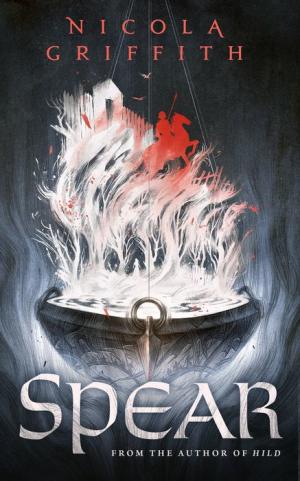

Spear
2. Monty Python and the Holy Grail (1975)
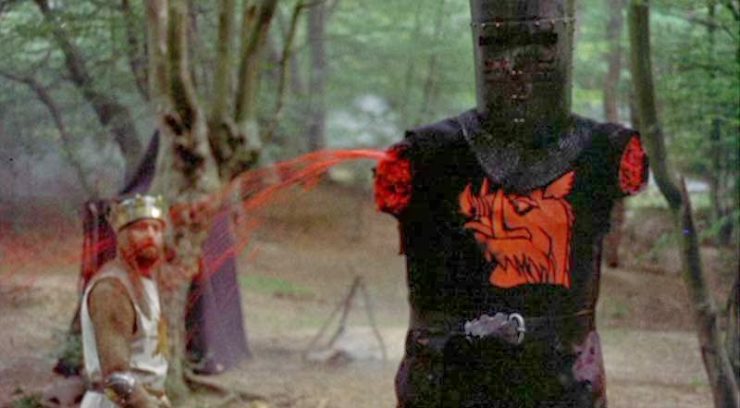
I’m assuming I don’t have to sum this sucker up for anyone on this site. As with all Python, the extra fun aspect is going back as an adult and discovering that there’s a well-made, meticulously researched movie under all the silliness.
Grails: The Grail Quest is granted to Arthur by God Himself! Pretty snazzy. The Quest includes Galahad’s stop at a castle full of temptresses, angry French people who don’t want the Brits stealing their Grail mythos, and even the detail from Malory’s Mort D’Arthur that Sir Bedevere is the Last Knight Standing during Arthur’s final siege.
Round Tables: Arthur and his Knights refer to Camelot as their home base, but they also decide not to go because (as Richard Harris would no doubt attest) “it is a silly place.” We never see a Guinevere, and its worth noting that in Spamalot Lancelot ends up with Prince Herbert.
Excaliburs: Arthur wields supreme executive power because some watery tart threw this sword at him. The knightly action is surprisingly good—the battle with the Black Knight is of course especially memorable. There is no Merlin, no Mordred, nor Morgana, but we do get TIM THE ENCHANTER, who seems like a powerful magical presence. —Leah
1. Camelot (1967)
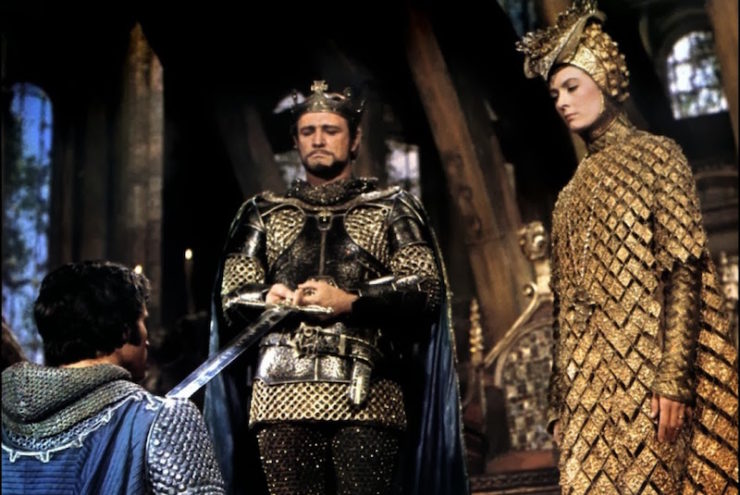
The film version of the beloved Lerner and Loewe musical, adapted largely from a piece of T.H. White’s The Once and Future King. Responsible for every 60s lounge singer recording their own rendition of “If Ever I Would Leave You.”
Grails: No one cares about grails here at all. Like if they could negative care, I’m pretty sure they would.
Round Tables: This story largely revolves around romance and political maneuvering. Guenevere (Vanessa Redgrave) loves Arthur (Richard Harris can sing!??), but she also loves Lancelot (Franco Nero), and Lancelot loves Guenevere and cares deeply for Arthur, and Arthur adores them both, and no one wants to hurt anyone, and everyone hurts each other. The result is that Arthur almost has to burn his wife at the stake (he’s been advocating rule of law for his Camelot to function, and that is the law for adultery… which seems like maybe a bad law to have in your very fair and noble kingdom of equality), and then has to battle his dear friend and destroy his kingdom. Guenevere feels bad for causing so much trouble and becomes a nun. All of this is the result of political machinations on the part of Mordred, who’s mad that Arthur won’t recognize his legitimacy as a son. If you’re into the fated romantic aspect of Arthurian legends and the idealism of the Round Table, this is where it’s at. If you love musicals, it’s even better.
Excaliburs: There is very little magic here, though Merlyn does make an appearance when Arthur calls on him for advice at the opening. The action of the story is largely a framing device; the musical starts and ends with Arthur on the battlefield, about to fight against Lancelot and his cohort. But there is also jousting! Guenevere gets Lancelot to joust three other knights because she doesn’t much like him at the start. It’s pretty great. Also, you can’t really get a better show of ego than Lancelot’s opening number, “C’est Moi.”
Out of all the options we have in this list, Camelot has many of the hallmarks that people love about Arthurian legend—the Round Table, the political upheaval, the ideology of Camelot, the love triangle. It is also lifted from one of the most popular retellings of the story. All of these aspects, combined with some truly sumptuous design, give it the top spot. —Emmet
* * *
So… the greatest versions of Arthurian legend on film are a musical and a comedy. Which brings us to one very important conclusion:
No one has made the great Arthur film this world deserves. Yeesh.
Originally published May 2017.










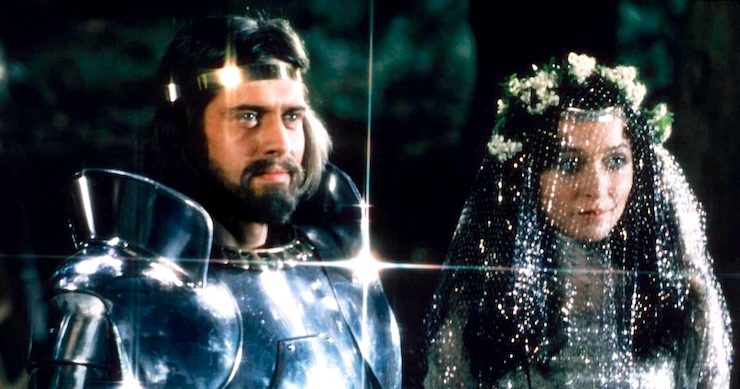
My Top 4 are basically the same, but slightly rearranged. For me, it’s Excalibur, Camelot, Sword in the Stone, Monty Python and the Holy Grail. I readily admit, a great deal of that positioning is based on nostalgia rather than “adherence to the myth.”
I read an article not long ago, but cannot recall where (it may even have been here on Tor.com), which posited that there is no true Arthurian “canon” because of the way the early stories came together. If anyone can point me towards it, I’d love to read it again.
Now I really need to get around to watching the titles on this list that I haven’t seen.
@1: I think this might be the article you’re thinking of?–
Every King Arthur Retelling Is Fanfic About Who Gets to Be Legendary
I’m supremely disappointed that the Sam Neil Merlin movie didn’t make the list
@@@@@ 3 Maybe because it was a miniseries instead of a movie? It is better than several films on this list in any case.
I was honestly surprised Knights of the Round Table (1953) with Robert Taylor and Ava Gardner didn’t make the list compared to some fairly obscure selections.
@2. Really good article, thanks.
This was also a good article, though my top three would be Monty Python, Camelot, Sword in the Stone
I will accept no other answer at #1 that isn’t Monty Python. If you can’t tell me the air speed velocity of an unladen swallow, then I don’t care to talk to you.
I have only watched four of the movies on this list.
For me, the ultimate Matter of Britain adaptation is still Excalibur, warts and all. (And it has more warts than a warthog; and why oh why are those armors SO SHINY?)
And of course Monty Python and the Holy Grail, the ultimate zany homage.
The Sword and the Stone is… charming, in its own way, yet barely Arthurian. (Full disclosure: I have not read the books. Maybe things get meatier after this?)
The Clive Owen movie was a pretty mirthless affair, all those hunky Sarmatians notwithstanding.
Sam Neill’s miniseries was pretty enjoyable, though it didn’t make here. And I just discovered it spawned a sequel, which I found at Goodwill the other day and plan to watch soon.
And so far I’m refusing to watch that Charlie Hunnam monstrosity. What is the point? (Apart from, well, Charlie Hunk’am.)
some notes on other movies. There was another Prince Valiant with Robert Wagner that was fun in its own way and better than the one mentioned. Knights of the Round Table tried to follow Arthurian legend. And Richard Harris had a huge pop hit in with Mcarther Park (so) that was remade into a disco hit in the later 70s by Donna Summer
Ah, now this is my topic :) I majored in medievel history in college because of this, and even helped present movies for a college course on the Arthurian Legends for several years. That said, I have to say I’ve never been happy with any movie adaptation. I especially have problems with anything adapted from TH White, as he threw the legends and any attempt at historical setting out the door. Camelot, while a fine musical, is more medieval 60’s rather than middle ages. Probably my favorite attempt at an adaptation was a BBC adaption of Mary Stewart’s The Crystal Cave. It’s flawed by the usual bad BBC budget, but it tries to cover the book fairly well, except ending much earlier than the book does. It’s a pity they never got to address The Hollow Hills. The American TV adaptation of The Mists of Avalon was also pretty bad (though with a much better budget), and changed the book too much. It was also hampered by a common problem: casting an Arthur who has no charisma or “presence.” Of the ones listed here, I’d give Excalibur my top pick, followed closely by Monty Python. The Ritchie film, First Knight, Prince Valiant, and Arthur the King (Bergan seemed to be channeling Mae West) aren’t even worth mentioning. Robert Wagner’s version was a much better Valiant.
I would have put Knightriders on the list, and fairly high up.
Seeing as how I finally got around to watching Excalibur just 2 days ago it’s like this article read my mind on what topic I wanted to read about. A good list.
There is also a Lancelot movie I saw many years ago and have not been able to find again.
It was dubbed into Spanish, but it was probably French. I remember it as Lancelot du Lac, yet I have not been able to locate it under that name. (NOT the Bresson movie, which I disliked.)
The production values kind of screamed “made for TV,” but it was interesting and compelling, and featured a fairy character who had grown up with Lancelot in the Lady of the Lake’s realm and functioned in the story as more or less Lancelot’s Jungian anima.
It dealt with most of Lancelot’s life after leaving the Lady of the Lake’s realm, where he had grown up: joining the Round Table, begetting Galahad with the Lady Elaine (whom he beds under an enchantment, believing her to be Guinevere); his years as a crazy hermit, and his final return to Arthur’s side.
If anyone can point me to this movie, I’d be eternally grateful.
It hardly seems fair to disparage an actor for not using a British accent for Lancelot when Lancelot isn’t British, but French. He should come across as foreign compared to the court at Camelot.
Slightly off topic:
Reasons I don’t care for the Camelot musical film:
Richard Harris, Vanessa Redgrave, Franco Nero, and David Hemmings when they could have had Richard Burton, Julie Andrews, Robert Goulet, and Roddy McDowell (who were all available to come over from Broadway but were not “big enough stars” for the film..
They kept “How to Handle a Woman” (a song that is horribly sexist) but cut “Fie on Goodness” and “The Seven Deadly Virtues” (songs that are horribly funny)?
If you’re an art film geek who happens to be a fantasy nerd on the side, the Robert Bresson film “Lancelot du Lac” is a gem. I can imagine if you aren’t steeped in, and on board with his interests as a filmmaker, you’d probably find it extremely slow and disappointing. But if like me, you love the exquisite torture of rigid formal experimentalism, existential emptiness, and punishing cinematic austerity… then it’s quite a delightful juxtaposition to find all this delivered in a King Arthurian shiny-knighty shell.
I had the great good fortune to see Richard Burton in Camelot on Broadway. The sheer star power that man could beam out just eclipsed anyone else on the stage. I can’t see anyone else as Arthur to this day. Although, Boorman’s film is just. so. SHINY!
@2 TH White was explicitly retelling Malory’s Morte dArthur, and got its historical setting (roughly 12th – 15th century) dead-on accurate. If you don’t like Malory, that’s fine, but don’t say White “threw any attempt at historical setting out the door”.
Oh, a tip of the hat to Patrick Morris. YES, KNIGHTRIDERS! I can only claim a senior moment for forgetting that one, which is probably my favorite Arthurian inspired film. It’s a wonderful “what if” movie centering around what if Arthur had been able to finally make Mordred understand what it means to be king, with Mordred going through his own grail quest to become a worthy successor. A wonderfully bitter sweet ending as Arthur is finally able to give up the burden of kingship and make his own journey to Avalon. All on motorcycles :)
While I didn’t care for Gere in First Knight, not using a British accent wasn’t significant. As another poster mentioned, Lancelot was French, and secondly, who has the slightest idea what those contemporary accents even were. In the middle to late 1st millennium CE, the people of Britain definitely weren’t speaking anything we would recognize as English. Wikipedia says Common Brittonic, which was a Celtic language that probably included a lot of Latin words–but no one knows for sure as there are no written remnants. The court folks were probably still speaking Latin, as the Romans were barely gone, and we don’t know how those accents sounded, either.
I think the only version of this I’ve seen is Camelot, which I saw at the age of ten or so. I don’t remember much of it except the ending, which I somehow remember vividly. (I recall reading adaptations of some of the Arthurian legends a few years earlier.)
“It is especially not a Richard Gere who can’t be bothered to even try a British accent.” This type of critique drives me nuts in reviews of Arthurian or Robin Hood-esque fiction. Assuming these characters weren’t 100% fictional, they weren’t speaking modern English. They weren’t speaking early modern English. They may have been speaking middle English (think Chaucer, et al.). They may have been speaking old English. Or as someone else posted while I was typing this, they might have been speaking Latin or common Brittonic.
If accents and languages are a sticking point for people, watch out for a new medieval movie coming out called The Last Duel, which has Matt Damon and Adam Driver playing two French knights!
Not a film, but the MacGuyver episode “Good Night MacGuyver” is one form of adaptation…
I have tried twice to watch Excalibur — I mean, Helen Mirren, right? But I couldn’t get past the first half hour. There’s not a whole lot of agreement among scholars of the Arthurian legends as to how much, if any, points to historical truths, but the 2004 Clive Owen film comes closest, in my unscholarly opinion, and was entertaining, too.
Richard Harris can sing, particularly about cakes getting left out in the rain.
S
Although The Sword in the Stone might seem like a typical Disney bowdlerisation, it’s not a bad riff on the original book, tonally and content-wise (e.g. Merlin really does turn Wart into a perch) so the sudden shift from Wart the universally despised to Wart the Future King of England is on T. H. White (and he did subsequently write three more books in the cycle, depicting Wart as an adult).
The core idea is that to rule wisely you must have some experience of what it’s like to be the underdog – that this is what makes Wart better qualified than his thuggish older brother to be king of England. I haven’t seen Camelot in years, but my memory is that the film deliberately references this, specifically the notion of ‘Might FOR Right’ (as opposed to the ‘Might IS right’ value-system epitomised by Kay).
Regarding accents, I like the stylistic choice made in the translation of Lysistrata that I read in Western Civ. Pointing out in the foreword that the Spartans were there to be noble yet uncultured foreigners who accidentally said wise things in a funny accent, the translator turned them Scottish and made the Athenians speak in RP.
So an Arthurian movie that assigns different ahistorical accents to each group based on how those accents are popularly regarded would be pretty neat.
I didn’t like Excalibur when I first saw it because I was young and a purist for the Chretien/Mallory version of the legend. Time and wider reading have made me more flexible. Monty Python’s Holy Grail is a joy from beginning to end, and the more you know about Arthurian the more you enjoy it! Personally I prefer the 1982 Richard Harris Camelot to the 1967 version.
And yes, I remember the MacGyver episode, dimly.
@6: African or European?
Go on, admit it, you’ve been waiting all day for someone to ask.
For shame that you could review Excalibur and comment on the young and stunning Helen Mirren, which of course, obviously, and not mention the young and stunning Nicholas Clay as a shining, gleaming and occasionally nude Lancelot. Boo, hiss.
@29,

@29 – Finally! I can now reply, “I…I don’t know.” *Aaaaaahhhh*
There hasn’t been a movie of Spamalot which is a shame, as it is more fun than the proverbial barrel of monkeys.
I knew Nicholas Clay slightly back in the late ’80s. He was a lovely person in every way — not just physically handsome, but kind and smart and funny. So sad when he passed away, far too young.
While I would hands down give first place to Monty Python, I would also like to mention Guillermo del Toro’s Trollhunters Netflix shows. While not strictly speaking “Arthurian” (on the occasions when it delves into that mythos, it’s mostly about Merlin), I still found it enjoyable.
On the negative side, while I haven’t seen it again since it was new, A Knight in Camelot is something I remember as particularly horrible.
I love many of the above films, for different reasons.
There are other possibilities: Gawain and the Green Knight (At least two on screen iterations, plus the upcoming version starring Dev Patel)
Since 2017, ‘The Kid who would be King’. Sir Patrick Stewart as Merlin (some of the time, it’s complicated). This is a fun film with a strong anti-bullying message.
Terrible: Hellboy (David Harbour). He does a good job, but the plot’s a wet mess. Yes, it links to Arthur.
Transformers: the Last Knight. Stanley Tucci is fun all too briefly as Merlin. Then the Autobots take over and appear at the end to seriously distract any drivers on the A303 near Stonehenge.
I know it’s not a movie, bit the BBC’s Merlin was just spectacular and I loved it to death.
Terry Gilliam’s The Fisher King is a nice updating/reworking of aspects of the Grail Quest as a PTSD traumatized doctor of mediaeval history/Arthurian legend (played by Robin Williams) complete with visions of satanic looking Red Knight in the centre of New York.
It’s a while since I’ve read The Once and Future King quartet but my memory is that The Sword in the Stone (the first of the four novels) is thematically very different from the others being primarily aimed at children and it does play around with history with Robin Hood popping into Arthurian England at one point. The other three books make more of an effort to be historically accurate though White does explicitly make Mordred a nazi-esque figure at the end (the last book was written during WWII)
Anyone in Torland remember watching the time travel movie A Connecticut Yankee in King Arthur’s Court, which is based on the novel by Mark Twain? IIRC I think Bing Crosby was the star. I saw it when I was a young child.
Presumably because he has much, much more fun playing villains – looking at stills from the film, it’s incredibly easy to see him as Prince Daemon Targaryen (or some other Prince of the Seven Kingdoms who happens to be mad, bad & dangerous to know).
Also provided that King Arthur is not being played by Sir Sean “why hello” Connery and therefore giving half the audience a sobbing nerdgasm.
In defence of FIRST KNIGHT, I can only plead that it has one heck of a soundtrack, the lovely Julia Ormond as the Lady Guinevere and a villain who consistently crops up in my imagination when putting a face on Bastard Feudalism.
Now if only it had other virtues!
They had a Peter Cushing and didn’t cast him as Merlin? What in Logres were they thinking?!?
Needs more Rasputin; I’d actually love to see Mr Peter Capaldi get a chance to play the Court Illusionist of Camelot – he’s definitely got the right diabolical look and slightly mad eyes.
It seems downright churlish to forget the lovely Cherie Lunghi as Queen Guinevere (who is, in fact, my favourite beauty in a film that looks **** Good): no wonder even la Mirren had to resort to illusion in order to land this particular hook-up!
Presumably because other films keep raiding the wealth of inspiration offered by the Matter of Britain the way a teenager works over the parent’s bank account and thereby sucks up all the oxygen that might fuel a bright & beautiful vision of the Once & Future King (well, that and due to there being so **** much to the Arthurian Mythos that it’s difficult to fit it into a single film with any kind of elegance).
Not much more to say, other than that DRAGONHEART probably belongs in the conversation about Arthurian cinema – while only one of the characters from the old legends appears, it’s hard to think of a film that gives more credit to the enduring inspiration of King Arthur & his knights (or one that has a more Awesome heroic dragon – throw in villainous dragons and you have more of a contest, but even so Draco must rank very highly, even all these years later) or does more credit to “Right, not might” (even if it takes Our Protagonist a while to get there).
@19: for that matter, the mind’s ear recalls Connery with a distinctly Sco”ish accent, which seems just as wrong as anything Gere did — if you accept the host’s theory that English accents would be preferred; I’m inclined to agree with commenters who challenge this.
I’m surprised by the praise for Camelot; I thought it had had its day after Jackie Kennedy spoke of JFK’s admiration for it. I’m also surprised that people aren’t turned off by the misogyny: making Guinevere a stone b**** who can sing “Shall a feud not begin for me?/Shall kith not kill their kin for me?/Oh, where are a maiden’s simple joys?” and twist three knights into challenging Lancelot is just too far from all the versions I know in print, and too close to the Gone with the Wind -style hate-turning-to-love trope that writers used to hang on women when stuck for something to do with a character.
@40, I think the point is Guenevere is in the beginning a giddy young girl full of chivalric romances. Of course she thinks having a war fought over her, just like her favorite heroines, would be great! But when it really happens decades later the older, wiser Guenevere is devastated.
BTW, am I the only female viewer who winces at Kiera Knightley’s braided leather tube top? That’s gotta hurt!
I third the shock at Knightriders’ exclusion from this list.
@41: maybe she’s just giddy in her first song — or maybe she’s showing the sort of person who will … persuade … three knights to challenge Lancelot. I suppose the performer is part of that; Vanessa Redgrave never convinced me she didn’t know exactly what she was about.
The last legion deserved to be on this list. Very underrated. I’ll watch just about any king arthur movie…. The Black Cauldron is another great Disney telling just from a different point of view.
It’s an interesting coincidence (or not?) that this week sees Alexandre Astier’s Kaamelott premiering in French-speaking countries. And I think it has its place right here with the best adaptations.
Originating as a comedy sketch TV series in the 2000’s, Kaamelott follows Arthur fall into depression following the incompetence of most of his Knights and advisers. Yet it ranges from incredibly funny (eg Percival and karadoc inventing their own martial art) to heartwrenching (the latter part of the fifth season), and was much appreciated during its run (some TV channels still run it!).
Now Astier has managed to recover rights on his work and many viewer look forward to this movie.
I can’t compare the movie yet, but I think the series had plenty of Graal, Roundtable and Excaliburs : Arthur, roman-raised bastard son of Uther and Ygerne, unifies Britain by presenting the quest for the Graal, removes from the stone and wields Excalibur, has a dysfunctional relationship with Guinevere besides having multiple mistresses, and heads roundtable reunions in full plate armour.
The sole downside of Kaamelott is its language, extremely slangy and fast (I once dubbed it the ultimate French proficiency test). Besides this, I cannot but recommend it.
@43, Vanessa Redgrave’s Guenevere probably is a b—h. But certainly not Julie Andrews’!
Given Launcelot’s ego in Camelot I’d probably go to lengths to humble him myself!
Cornell Wilde had a vanity project which I saw on television back in the seventies called ( I think) The Sword of Lancelot. His wife Jean Wallace co starred. I remember it being quite violent for the time it was made ( The early sixties ).. It was mostly concerned with the adulterous affair between Lancelot and Guinevere. And lots of battles. I would actually like to see it again.
@46: I have no trouble believing that Andrews’s Guinevere was a better person, but the topic was movies. For that matter, from what I hear a lot of the stage cast was better behaved; Andrews and Burton held tea breaks, while Richard Harris was reportedly drunk on the movie set. (All this is anciently pre-net gossip that I can’t provide sources for; believe if you will.)
@38 Yes, I have the DVD of that film. An entertaining little musical comedy with Bing Crosby, Rhonda Fleming, and Cedric Hardwicke as King Arthur. Had very little to do with the legend though.
I always loved the Merlin miniseries from 1998. But yes, we are still waiting for a really good Arthur movie!
I’ve only seen 3 of these, and I love them all, which I credit to a really good instinct for avoiding things that will annoy me. If I ever saw The Sword and the Stone, I’ve forgotten it, which is not a good sign. By the time of its release, I was already “too old” for Disney, and hadn’t been a fan anyway, preferring the more anarchic Looney Tunes. On the other hand, that means that I was old enough when I saw the Python movie, my number 3, 1st run to get right away how well made and impeccably researched it was. My father had been a history professor.
I was raised on musicals, and Camelot is my number 2. If Ever I Would Leave You did suffer from severe overexposure on MOR radio in the ’60s, but it’s recovered nicely.
Leaving Excalibur as clear number 1. Between 1st run, rep & my DVD, I’ve seen it about a gazillion times Boorman is one of my all-time favorite directors, and Excalibur isn’t even my favorite Boorman, which is Point Blank. I’m even one of the 3 people on Planet Earth who actually liked Exorcist II: The Heretic, and I don’t care who knows it. I liked what Boorman did with the dialog in Excalibur, and for me it did what I think he intended it to do. The music is used very appropriately, especially the Orff, which often can sound cliched. Boorman always had a keen ear, as witness the Allegretto from Beethoven’s 7th in the underrated Zardoz. I even like the fact that Arthur’s armor in his wedding scene is polished to such an insane intensity that you can see the cameras reflected in it. I’m actually not kidding. I appreciate going way above and beyond what’s necessary. BTW, Igraine was played by Katrine Boorman, the director’s daughter.
Fair warning – crankiness ahead.
On the one hand, I generally approve of these periodic reposts; it gives newer members of the gallery a chance to weigh in with their own preferences, and there’s the chance to discuss material that may have appeared since the prior posting. But I wish – especially in this case, where the views expressed are attributed to house persona Stubby the Rocket – that the editors of the reprised post would at least make a nominal effort to look through the comments and update the piece to acknowledge legitimate omissions from the prior incarnation(s) of the list in question. [Actually, one of the really interesting things about this particular survey is that we get Stubby in first-person mode, which is kind of fascinating and very, very rare.]
In the present case, my annoyance is the continued omission of Quest for Camelot, released by Warner Animation in 1998, which was (a) a theatrical release, (b) a legitimate Arthurian story adapted (rather freely, but no more so than certain Disney efforts) from the excellent if undeservedly obscure Vera Chapman novel The Queen’s Damosel, and (c) is, in fact, available on a number of the major streaming platforms even as I type. That meets all the criteria for inclusion cited in the essay – and the post’s text and its original headline both assert that this essay’s list is meant to be complete, or “a basic master list”, not simply a top-ten exercise.
I grant that Quest for Camelot is not a perfect film by any means, but it was somewhat ahead of its time in featuring a female lead, included a quite respectable voice cast (including Cary Elwes, Gary Oldman, Jane Seymour, and Pierce Brosnan), and for all its flaws is arguably better-executed than some of the movies on the bottom half of the present list. It’s all very well to say, “well, but that’s what the comment section is for”, but in this specific case, at least, I beg to differ. This is an instance where a repost can and should serve as an opportunity to revisit and improve on the original iteration.
[/end crankiness mode]
More than one commenter has complained that Arthur was colorless. Insufficiently charismatic.
Arthur has his own story sequence. But his Camelot attracted other cycles. Presented as the Knights of the Round Table.
Arthur became the host of a variety show. This time it’s—the Green Knight! This evening—the Kitchen Knight!
The King / Host sets the tone and assigns quests. “This week, it’s—the Beatles!” “Tonight—Salvador Dali!”
At the water cooler people didn’t discuss Ed Sullivan. They talked about The Mop-tops.
Of course Arthur lacks charisma.
The thing about merlin in excalibur is that he has that unique bald cap…. wearing generic brown robes could they give him is own unique armor.
Also it looks like Guy Ritchie filmed on the great wall in that still above… am I the only one who thinks that? I also wanted to ask…. can anyone recommend me on where to start with the Prince Valiant books? Or if they’re in print somewhere? That art is….wow